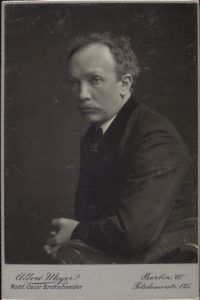
We mark the world premiere – on January 25, 1909 – 112 years ago today – of Ricard Strauss’ opera Elektra at the Semperoper, the opera house of the Sächsische Staatsoper – the Saxon State Opera – in Dresden. Today acknowledged as one of the masterworks of the operatic repertoire, the premiere of Elektra uncorked a degree of critical controversy equaled only by Strauss’ own opera Salome in 1905 and Igor Stravinsky’s The Rite of Spring in 1913.
If I were to ask you who was the most famous and controversial living composer in 1909, who would you name? Gustav Mahler, born in 1860? No: Mahler was then best known as a conductor and a composer of long and rarely performed symphonies. Igor Stravinsky, born in 1882? No: Stravinsky didn’t appear on Europe’s artistic radar until 1910, when his ballet The Firebird was premiered in Paris on June 25th of that year. Arnold Schoenberg, born 1874? In 1909, Schoenberg was hardly known outside of his native Vienna, and many (if not most) of those Viennese who did know his music considered him a crackpot; okay, a talented crackpot.
You know where this is going. The most famous, controversial, and (not incidentally) wealthiest living composer in 1909 was Richard Strauss, hands down, no question about it.
Music History Monday for June 11, 2018 marked Strauss’ birthday and focused, in particular, on his controversial actions (and inactions) during World War Two. The only controversies we are going to dwell on today are those created by his two so-called “modern” operas: Salome and Elektra.
I began that Music History Monday post in 2018 with the following words, words I continue to stand behind:
I will pull no punches here: in my opinion, Richard Strauss was one the greatest composers of the nineteenth and twentieth centuries. He was a melodist and musical dramatist on near par with Mozart, which is, I think, just about the highest compliment any composer can be paid. His brilliant (though, admittedly, sometimes sprawling) tone poems – From Italy, Don Juan, Macbeth, Death and Transfiguration, Till Eulenspiegel’s Merry Pranks, Thus Spoke Zarathustra, Don Quixote, A Hero’s Life, Domestic Symphony, and An Alpine Symphony – constitute, virtually, a genre of experimental music of their own. His superb operas pick up from where Richard Wagner’s “music dramas” leave off (which inspired the wags of his time to call Strauss “Richard II”). He continued to turn out masterworks until the very end of his long life; his exquisite Oboe Concerto (1945) and Metamorphosen for strings (also 1945) were composed when he was 81; his Four Last Songs (1948) was composed when he was 84.
In 1947, the 83-year-old Strauss declared with typical self-deprecation:
“I may not be a first-rate composer, but I am a first-class second-rate composer.”
We beg to differ; Strauss was, in fact, a first-rate composer all the way around: a consummate technician; a dazzling orchestrator; a superlative harmonist who managed to be a modernist (in terms of his expressive content, his use of time and chromatic counterpoint) and a traditionalist (in terms of his use of traditional tonality) all at once.…
Continue reading, only On Patreon
Become a Patron!Listen on the Music History Monday Podcast
Podcast: Play in new window
Subscribe: Apple Podcasts | Spotify | Pandora | iHeartRadio | RSS | More
